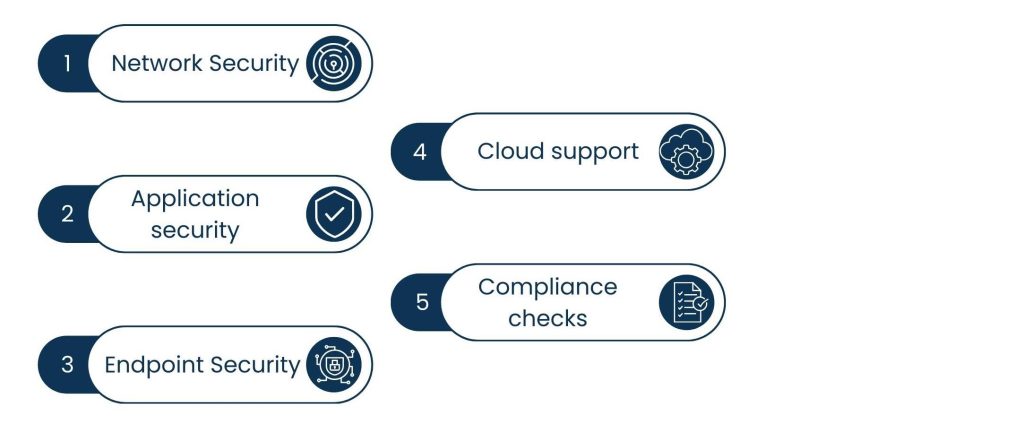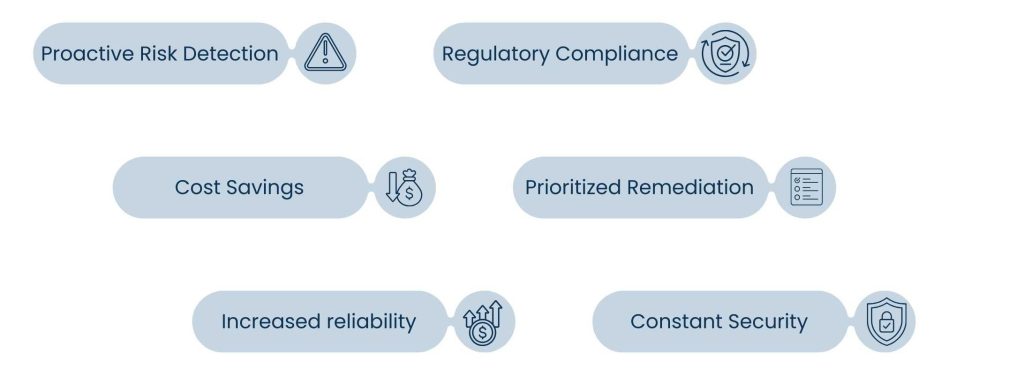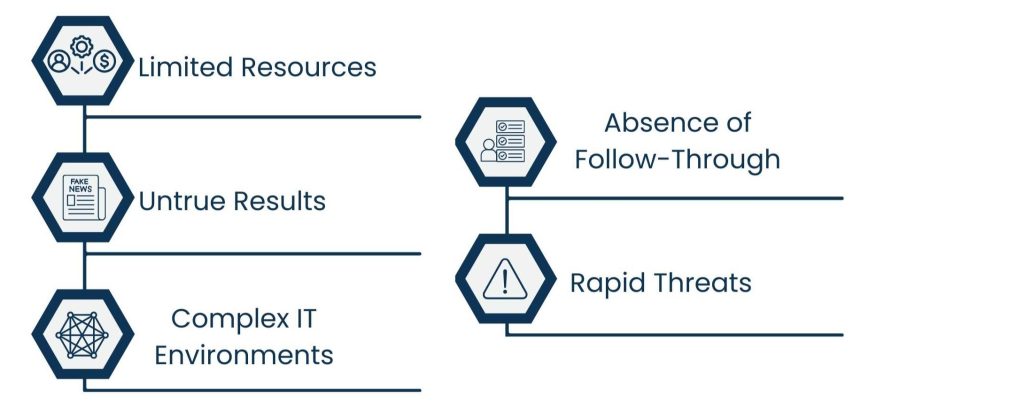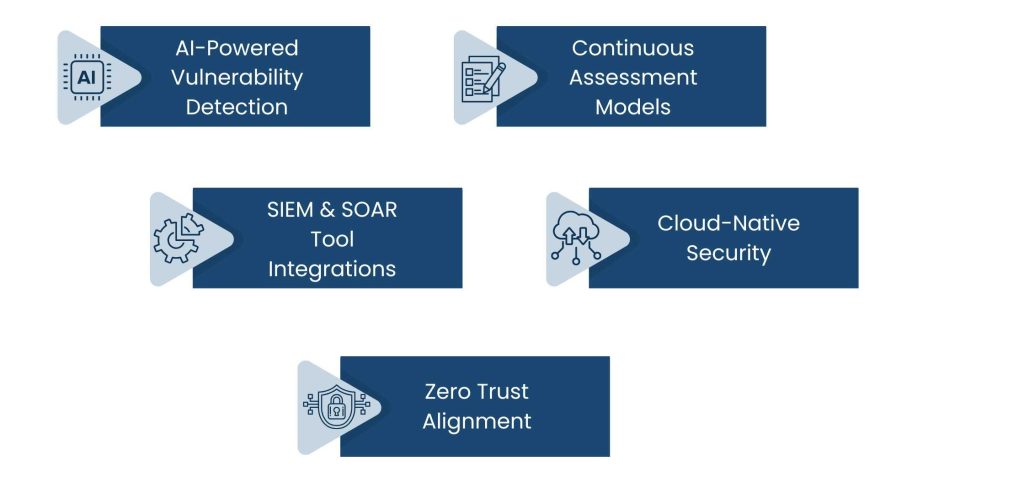Introduction
With the growing digital scenario, Cyberattacks are most commonly faced by any organization. Vulnerability assessment services are an important part of any cybersecurity strategy for many such reasons.
The complete process of finding, evaluating, and ranking vulnerabilities in an IT infrastructure organization is known as a vulnerability assessment. These vulnerabilities can result in expensive security breaches and affect endpoints, servers, apps, and networks if left unchecked.
Companies make themselves aware of possible threats before their exploitation by the attackers through frequent checks. More significantly, they have a remediation plan in place, whereby security expenditures are targeted and rewarded. It may be regulatory compliance, customer data protection, or operational continuity, but vulnerability assessments form the cornerstone of good security.
This blog delves into the nature of vulnerability assessment services, how they benefit organizations, the problems facing implementation, and why companies need to incorporate them into their overall cybersecurity strategy.
Define Vulnerability Assessment Services
Vulnerability assessment services thoroughly examine an organization’s IT assets to identify potential holes that an attacker could exploit. Furthermore, rather than conducting penetration testing to simulate real threats, these services focus on generic detection and risk prioritization.

Key areas tested include:
- Network Security: Identifying old portals, insecure settings, and open ports.
- Application security: Mobile and web applications’ flaws, like SQL injection and cross-site scripting (XSS), are identified.
- Endpoint Security: Verifying the patching and updating of workstations, mobile devices, and employee devices is known as endpoint security.
- Cloud support: Google Cloud, Amazon Web Services, or Azure setup issues fixing.
- Compliance checks: It confirms that you meet to regulations such as HIPAA, PCI-DSS, and GDPR.
A comprehensive report listing all issues, their impact, and potential fixes is usually the result of a vulnerability assessment. This allows businesses to strengthen their barriers beforehand.
Also Read: Google Ads Consultant
Advantages of Vulnerability Assessment Services

Vulnerability assessment services’ advantages for organizations are as follows:
- Proactive Risk Detection: gets on vulnerabilities, even before a hacker does.
- Regulatory Compliance: Assures compliance with ISO 27001, PCI DSS, HIPAA, and such laws.
- Cost Savings: Financial restraints can be reduced via violations, outages, and penalties.
- Prioritized Remediation: Financial limitations are reduced by violations, outages, and penalties.
- Increased reliability: Shows commitment to protecting customer data.
- Constant Security: Ensure protection against evolving threats by consistent scanning.
Businesses that regularly search for vulnerabilities successfully stop breaches and strengthen their defenses against future attack techniques.
Performing Vulnerability Scans and Their Challenges

Companies usually encounter difficulties when implementing vulnerability scanning services, even though they are essential:
- Limited Resources: Small businesses lack dedicated cybersecurity staff due to limited resources.
- Untrue Results: Automated technologies have the potential to identify issues that aren’t there.
- Complex IT Environments: Full scanning becomes difficult for hybrid infrastructures such as cloud + on-premises.
- Absence of Follow-Through: Maintaining dependability requires routine follow-ups following vulnerability detection.
- Rapid Threats: New vulnerabilities occur that make regular reevaluation necessary.
Organizations should incorporate assessments into their continuous security strategy and mix automated scanning with professional analysis to overcome these obstacles.
Also Read: QuickBooks Virtual Assistant
Types of Vulnerability Assessment Services

To get vulnerability assessments properly done, several specialized methods are followed. Such as:
- Network-based scans: Firewalls, routers, and communication protocols can all find flaws.
- Host-based scans: Examine each device’s operating system, configuration, and patch level using host-based scans.
- Application Scans: Identify issues with third-party and proprietary programs.
- Wireless security scans: Find potential threats in Wi-Fi networks, such as unwanted access points.
- Cloud security scans: Look for loose IAM rules, exposed APIs, and configuration errors.
All services are selected based on business requirements, regulatory needs, and exposure to threats.
Vulnerability Assessment Services and Their Future
As threats in cyberspace become more advanced, so do the ways to assess vulnerabilities.

Future trends are:
- AI-Powered Vulnerability Detection: Using machine learning to forecast and prioritize risks is known as AI-Powered Vulnerability Detection.
- Continuous Assessment Models: Shifting from yearly audits to frequent vulnerability monitoring.
- SIEM & SOAR Tool Integrations: Joining findings to response automation systems.
- Cloud-Native Security: Customized tests for hybrid and multi-cloud environments.
- Zero Trust Alignment: Aligning assessments and evaluations with the design of a zero-trust system is known as “zero trust alignment.”
Businesses can improve their digital transformation strategy and obtain a competitive advantage by adopting these practices and concentrating on long-term, comprehensive objectives
Conclusion
Businesses cannot afford to take a security risk with growing cyberattacks. They may identify and address vulnerabilities before they become expensive mishaps by using vulnerability assessment services.
Organizations may strengthen consumer confidence, lower financial risk, and reinforce compliance by committing to continuous testing. More critically, they create a proactive cybersecurity position—one that responds to evolving threats ahead of when harm is already done.
At Tasks Expert, we recognize that companies require an equilibrium of technology and experience to protect their digital content. Our assistance ensures that organizations incorporate smarter and more dependable security measures into their processes. Are you set to future-proof your company? Vulnerability assessments are the initial step towards enhanced cybersecurity.
Frequently Asked Questions
Vulnerability assessment is the process of identifying vulnerabilities in IT networks, applications, and systems using a variety of testing methods before an attacker takes advantage of them.
Penetration tests mimic actual attacks, whereas vulnerability assessments find and prioritize those gaps.
Best practice is every quarter or following significant system updates, although ongoing monitoring provides the best defense.
Common tools are Nessus, Qualys, OpenVAS, and Burp Suite for vulnerability scans and reporting.
Yes, compliance with regulations like HIPAA, PCI-DSS, ISO 27001, and GDPR identifies compliance gaps.
About Us
Tasks Expert offers top-tier virtual assistant services from highly skilled professionals based in India. Our VAs handle a wide range of tasks, from part time personal assistant to specialized services like remote it support services, professional bookkeeping service etc. Furthermore, it helps businesses worldwide streamline operations and boost productivity.
Ready to elevate your business? Book a Call and let Tasks Expert take care of the rest.









